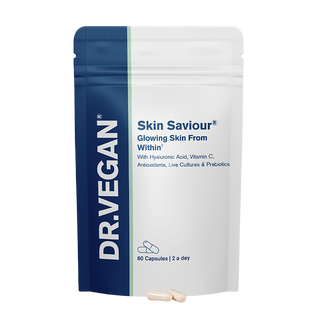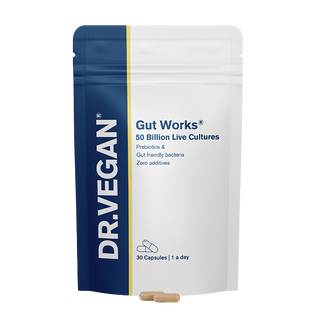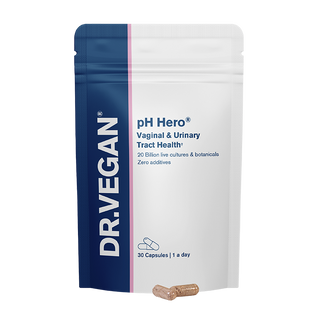8 most common questions about probiotics

Probiotics are one of the fastest-growing supplement categories, and they're used by hundreds of millions of people across the world. The biggest driver of the growth in probiotics has been the new research and evidence released over the past 10 years on the importance and role of gut health in our overall wellbeing and the role probiotics and prebiotics have on everything from our gut health to the health of our skin, our brain and mental health, our immunity and much more.
Isabelle Nunn, a registered nutritional therapist and who was a practising pharmacist for 10 years, answers the 8 most commonly asked questions about probiotics, including:
- What are CFUs in probiotics?
- What are the most common strains of live cultures?
- Are all probiotics the same?
- Is one strain better than multi-strain?
- Are probiotics only for gut health issues?
- Are prebiotics important?
- What are postbiotics?
- Does everyone need a probiotic?
1. What are CFUs in probiotics?
If you have been delving into the topic of probiotics or come across a probiotic supplement in a store, you will probably have heard of the term ‘CFU’. But what does CFU mean and should it impact your choice of probiotic?
CFU stands for 'colony-forming units', which refers to the number of live and active microorganisms that you can expect in a probiotic supplement. This is determined in the laboratory, and CFU tells us the viability and number of microorganisms in the probiotic prior to exposure to the gastrointestinal tract. The active microorganisms tend to live and grow together as colonies, even though we sometimes refer to them as individual bacterial strains. CFU essentially refers to the beneficial bacteria that you can expect, as a total count per dose.
Is the number of CFUs important?
The number of CFUs is one important factor to consider when taking a probiotic, but it's not the only factor. Probiotics are expensive to manufacture, so a higher CFU can often be a good indication of quality or whether a probiotic is value for money or not, however, it doesn't necessarily mean it has better efficacy or outcomes. Likewise, a low CFU count may (or may not) be adequate for your particular health goal. Most probiotic supplements have a range between 1-20 billion CFUs of live bacteria per dose, while there are some that have 50 billion or more, and there are others with 100 billion and more.
What is an adequate dose of CFU?
Some scientists consider a total daily dose of one billion (1*109) CFU to be the minimum effective amount in a probiotic supplement. This is generally stated, unless clinical research demonstrates otherwise.
As a general rule of thumb, the right dose of probiotics will depend on several factors, one of which is the health needs specific to you as an individual and the concerns you are hoping to resolve. For example:
Probiotics for immunity: For those who are generally healthy but seeking daily immune and digestive support, a minimum level of 10-20 billion CFU per daily dose can be an adequate amount to start with, depending on the individual.

Probiotics for IBS: Symptoms of IBS vary enormously. A DR.VEGAN® survey of 246 customers showed that 70% of people suffer from bloating, while more than 40% suffer from IBS*, from mild to extreme. IBS can be intermittent or chronic (persisting over a long time), so the level of probiotics required to solve IBS can vary. If you suffer from persistent IBS, a supplement of at least 40bn CFU should be considered and taken consistently over a sustained period of time to rebalance the gut microbiome. Find out more in 'best probiotics for IBS'.
Probiotics for skin: Probiotics can be effective for skin health due to the gut-skin axis, but there are lots of other important nutrients your skin needs and for your body to fuel your natural collagen production. For example, a skin supplement containing 5bn CFU alongside ingredients such as Hyaluronic Acid, Vitamin C, and powerful antioxidants will be more effective for your skin than a probiotic with 20bn CFU but without these other vital nutrients for skin. You may be interested in reading 'The truth about collagen'.
When choosing a probiotic supplement, it's good to check if there has been any research into the efficacy of the supplement itself. If there has been research, check that it has been conducted on at least 100 people to be statistically robust. Some brands will claim their probiotics have been 'clinically trialled' yet when you look at the detail, they've only been researched on 30 people!
2. What are the most common strains of live cultures?
Different strains of probiotics serve specific functions. Here are some of the most common strains:
- Lactobacillus acidophilus: Supports digestion and helps maintain a healthy balance of gut bacteria. It is found in Gut Works®, pH Hero® and Men's ProMulti.
- Bifidobacterium Lactis: A brilliant strain for the immune system, improving gut barrier integrity and supporting regular bowel movements. Bifidobacterium Lactis is found in Gut Works®.
- Lactobacillus rhamnosus: Known for reducing diarrhoea and supporting overall gut health, it is included in Gut Works® and pH Hero®.
- Lactobacillus casei: This is a transient probiotic, which means it passes through the gut within a couple of weeks. However, when it passes through the gut, it creates a more favourable environment, which enhances the survival and growth of other strains. Lactobacillus casei is found in Gut Works®.
- Streptococcus Thermophilus: Aids in breaking down lactose and supporting digestion, particularly in those with lactose sensitivity. It can be found in Gut Works®.
- Lactobacillus Plantarum: Known for its antioxidant properties, it promotes gut health by reducing inflammation and supporting nutrient absorption. Lactobacillus plantarum is found in Gut Works®, pH Hero® and HeartPro®.
- Lactobacillus Crispatus: Particularly effective in supporting vaginal health and preventing infections such as bacterial vaginosis. It can be found in pH Hero® and Women's ProMulti.
- Lactobacillus Reuteri: Enhances the vaginal microbiome and helps regulate pH levels, promoting overall wellness. It can be found in pH Hero® and Women's ProMulti.
-
Bifidobacterium Bifidum: Aids in digestion, enhances gut barrier health, and reduces inflammation. It can be found in Men's ProMulti.
3. Are all probiotics the same?
The answer to this question is a definite NO. While more research is required to fully understand the multiple benefits offered by different probiotic strains, we do know that not all probiotics are equal. For example, some bacterial strains, such as Bifidobacterium lactis, are extensively studied for combating IBS and gut health issues, while other strains such as Lactobacillus reuteri and Lactobacillus crispatus, are more studied for their benefits for the vaginal microbiome, combatting vaginal dryness, infections and UTIs. Learn more in how to prevent UTIs.
The two most important bacterial species are Lactobacilli and Bifidobacteria.
- Lactobacilli bacteria live in our digestive, urinary and genital systems and can be found in fermented foods such as yoghurt.
- Bifidobacteria live in our intestines as lactic acid bacteria and can also be found in fermented foods.
Examples of what differentiates one probiotic supplement from another include:
- The inclusion of well-researched strains of bacteria.
- Synbiotic effects of prebiotics and probiotics.
- The synergistic effects of the combination of particular strains of bacteria have been shown to be effective together for the intended purpose.
- The quality of the bacterial strain.
4. Is one strain better than a multi-strain?
Although beneficial bacteria as a whole have been shown to bring positive outcomes to health and wellbeing, nutritionists are regularly asked whether a single-strain probiotic is better than a multi-strain product. The answer is: it depends on what the science says!
Combinations of probiotic strains have had robust research for a number of different purposes. The human body’s microbiome contains over 800 different bacterial species, so it is inherently diverse and naturally a multi-strain, multi-species environment. It is therefore generally believed that we need to help repopulate the microbiome with a combination of strains to complement our natural flora, rather than one specific strain.
However, some studies support the benefits of a single-strain product at a particular dose for a specific condition. For instance, when used on its own at high dosages, Saccharomyces boulardii has become increasingly popular and effective for acute gastrointestinal disorders such as IBS-D, which is a specific type of IBS. You may be interested in 'What is IBD (Inflammatory Bowel Disease)?' or learning about the 'Common & unusual symptoms of IBS'.
Multiple-strain probiotic products have the advantage of being synergistic, with the strains working more effectively together as well as individually supporting the functions of other species. Many studies show that a combination of strains provides more benefits than a single-strain probiotic. The synbiotic effect of the adhesion properties of the bacterial strain Bifidobacterium lactis’, for example, was more than doubled when coupled with the Lactobacillus rhamnosus strain.
Similarly, 'synbiotics' show great advantages compared to just probiotics on their own. Synbiotics are a mixture of prebiotics and probiotics, where each works both independently and together, resulting in greater outcomes. Learn more in 'What are prebiotics'.

Gut Works® combines prebiotics and fibre with 6 clinically studied strains of probiotics, including Lactobacillus acidophilus, Bifidobacterium and Streptococcus.
A high-quality multi-strain probiotic is often considered to be one that offers 5 or 6 strains. However, when more than 6 strains are used and where the level of the individual strains is lower as a result of accommodating more strains, this can raise more questions and uncertainties. Remember, if one strain of probiotic is used alongside other vital nutrients for a particular health condition, such as a probiotic combined with plant-sterols for heart health, this will be better than a supplement with no strains at all or a supplement with multiple strains and not the plant-sterols and other important nutrients for the heart. So, the number of probiotic strains really depends on the science, the presence or not of other nutrients, and the specific health goal you're looking to address.
5. Are probiotics only for gut health issues?
The vast majority of clinical studies have shown that probiotics exert beneficial effects on gut health issues ranging from IBS, bloating and gas, to acid reflux and constipation. But we also know that by restoring the intestinal balance of harmful microbes with healthy bacteria, the beneficial effects experienced reach far beyond gut health. You can learn more in the '6 signs of an unhealthy gut' and 'Why you should improve your gut health'.
There are bi-directional relationships that exist between the gut and other organs that have been referred to as the gut-brain axis, the gut-skin axis or the gut-vagina axis, for instance. The gut also plays a vital role in regulating our hormones, and when there is 'dysbiosis' (an imbalance in the gut microbiome), this can lead to conditions such as 'Leaky gut syndrome', exaggerate symptoms of menopause, contribute to symptoms of ADHD, and many other health issues.
As well as combating IBS, some of the beneficial effects of probiotics have included immune support, support for inflammatory skin conditions including acne or psoriasis, and helping lower markers of metabolic syndrome when combined with a healthy diet and lifestyle.
If you are looking for vaginal health support, look for bacterial strains like L. crispatus and L. reuteri in particular, which are both found in pH Hero®, an advanced formula for vaginal health, supports dryness, UTIs and infections. These can help keep the good, friendly bacteria in the gut and vagina in check, helping to maintain a more balanced vaginal flora and natural pH.
Skin Saviour®

Similarly, if supporting your skin concerns is your main health goal, consider products with probiotics such as Skin Saviour®, along with giving your digestion and gut bacteria some TLC with plenty of whole foods, prebiotic fibres and antioxidants. Browse the DR.VEGAN® range of probiotics.
6. Are prebiotics important?
The short answer to this question is YES. Prebiotics are plant fibres that are not digested by your body, which means they travel through your stomach to your digestive tract, where they feed and support the probiotics in your gut. When probiotics feed off prebiotics, they produce lactic acid and short-chain fatty acids that improve the digestion of foods and the overall health of your gut microbiome.
Put simply, without prebiotics, probiotics are not nearly as effective. You can easily gain good prebiotics through your diet. The best foods for prebiotics include mushrooms, garlic, onions, flax seeds, oats, bananas, artichokes and cabbage. Continue reading about the importance of prebiotics.

7. What are postbiotics?
Postbiotics are considered to be the compounds created by bacteria during the fermentation process. They are the beneficial end products of bacteria. Unlike prebiotics, postbiotics do not contain live microorganisms; however, they can still be effective in their own right. Postbiotics can contain nutrients like Vitamins B and K, as well as substances that slow down the growth of unhealthy bacteria.
The role of postbiotics and their use in supplements is an evolving field of science and very much in its infancy.
8. Does everyone need a probiotic?
Before embarking on a new supplement routine, make sure you're eating a nutritious diet, taking regular exercise, maintaining a healthy weight, reducing stress and ensuring you're getting enough sleep. If you're not sure what your diet is missing, create your free Diet Profile, which shows you the nutrients your body is getting in your diet and those you're missing out on.
Whether you need a probiotic or not is up to the individual, their circumstances, their health status and the health concerns they are seeking to improve. Generally, healthy people might just want to take a probiotic daily to keep their immune system in check, support their gut health when travelling and eating new cuisines or improve their skin condition.
In other cases, especially where there may be an imbalance of bacteria in the gut (commonly referred to as 'dysbiosis'), which could be caused by a course of antibiotics, stress or an infection caused during travel, probiotics can be very beneficial. You may be interested in reading more about taking probiotics after antibiotics and signs your body is fighting an infection.
Probiotics are generally safe for most people, but if you suffer from an immune disorder or a short bowel syndrome, if you have a serious illness or if you take certain medications, including immunosuppressants, you should consult your doctor first. As a precaution, it is best to consult a paediatrician or other healthcare provider prior to giving probiotics to infants or pregnant women.
Discover our range of award-winning vegan supplements and probiotics.
*Based on a UK survey conducted by DR.VEGAN® of 246 customers, nationally representative, during August & September 2022. All customer survey findings reflect our own efforts and have not been influenced or verified by any external organisations or third-party entities.
Want to hear more from our nutritionists? Sign up to our email newsletter for insights and exclusive offers:
You may also enjoy reading:
- Estrobolome, your gut & oestrogen
- The 'Gut-Hormone Connection' explained
- Menopause and gut health: How menopause affects the gut microbiome
- Gum disease and the oral microbiome
- Diverticulitis: Diet and Treatments for Relief
- Why you should improve your gut health
- Is gut health and erectile dysfunction linked?
References
- International Scientific Association of Probiotics and Prebiotics (ISAPP) https://isappscience.org/for-clinicains
- Hill, C. et al. (2014).The International Scientific Association for Probiotics and Prebiotics Conscensus Statement on the Scope and Appropriate Use of the Term Probiotic. Nat Rev Gastroenterol Hepatol. 11 (8):p 506-14. The International Scientific Association for Probiotics and Prebiotics consensus statement on the scope and appropriate use of the term probiotic | Nature Reviews Gastroenterology & Hepatology
- National Institute of Health, Office of Dietary Supplements (2023) Probiotics - Health Professional Fact Sheet (nih.gov)
- 4 Żółkiewicz J. et al. (2020) Postbiotics-A Step Beyond Pre- and Probiotics. Nutrients;12(8):2189. Postbiotics—A Step Beyond Pre- and Probiotics - PMC (nih.gov)
- McFarland, LV et al.(2021) Efficacy of Single-Strain Probiotics Versus Multi-Strain Mixtures: Systematic Review of Strain and Disease Specificity. Dig Dis Sci 66, 694–704. https://doi.org/10.1007/s10620-020-06244-z.
- Markowiak P., and Ślizewska K. (2017) Effects of Probiotics, Prebiotics, and Synbiotics on Human Health. Nutrients;9:1021. Effects of Probiotics, Prebiotics, and Synbiotics on Human Health - PMC (nih.gov)
- Swanson, KS. et al. (2002) The International Scientific Association for Probiotics and Prebiotics (ISAPP) consensus statement on the definition and scope of synbiotics. Nat Rev Gastroenterol Hepatol 17, 687–701 (2020). The International Scientific Association for Probiotics and Prebiotics (ISAPP) consensus statement on the definition and scope of synbiotics | Nature Reviews Gastroenterology & Hepatology
- Ouwehand, A.C. et al (2000)The mucus binding of Bifidobacterium lactis Bb12 is enhanced in the presence of Lactobacillus GG and Lact.delbrueckii subsp.bulgaricus. Letters in applied microbiology, 30 (1):10-13. The mucus binding of Bifidobacterium lactis Bb12 is enhanced in the presence of Lactobacillus GG and Lact. delbrueckii subsp. bulgaricus - PubMed (nih.gov)
- Skrzydło-Radomańska B. et al. (2020).The Effectiveness of Synbiotic Preparation Containing Lactobacillus and Bifidobacterium Probiotic Strains and Short Chain Fructooligosaccharides in Patients with Diarrhea Predominant Irritable Bowel Syndrome-A Randomized Double-Blind, Placebo-Controlled Study. Nutrients;12(7):1999. The Effectiveness of Synbiotic Preparation Containing Lactobacillus and Bifidobacterium Probiotic Strains and Short Chain Fructooligosaccharides in Patients with Diarrhea Predominant Irritable Bowel Syndrome-A Randomized Double-Blind, Placebo-Controlled Study - PubMed (nih.gov)
- Ayesha, I. et al. (2023). Probiotics and Their Role in the Management of Type 2 Diabetes Mellitus (Short-Term Versus Long-Term Effect): A Systematic Review and Meta-Analysis - PMC (nih.gov); 15 (10):e46741.
- Rahimi, F. et al (2022) Efficacy of the Synbiotic supplementation on the metabolic factors in patients with metabolic syndrome: A randomised , triple-blind, placebo controlled trial. Int J Clin Practice:2022: 2967977. Efficacy of the Synbiotic Supplementation on the Metabolic Factors in Patients with Metabolic Syndrome: A Randomized, Triple-Blind, Placebo-Controlled Trial - PubMed (nih.gov)



















